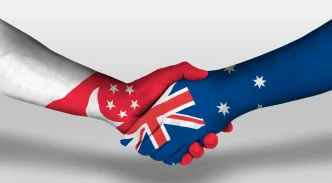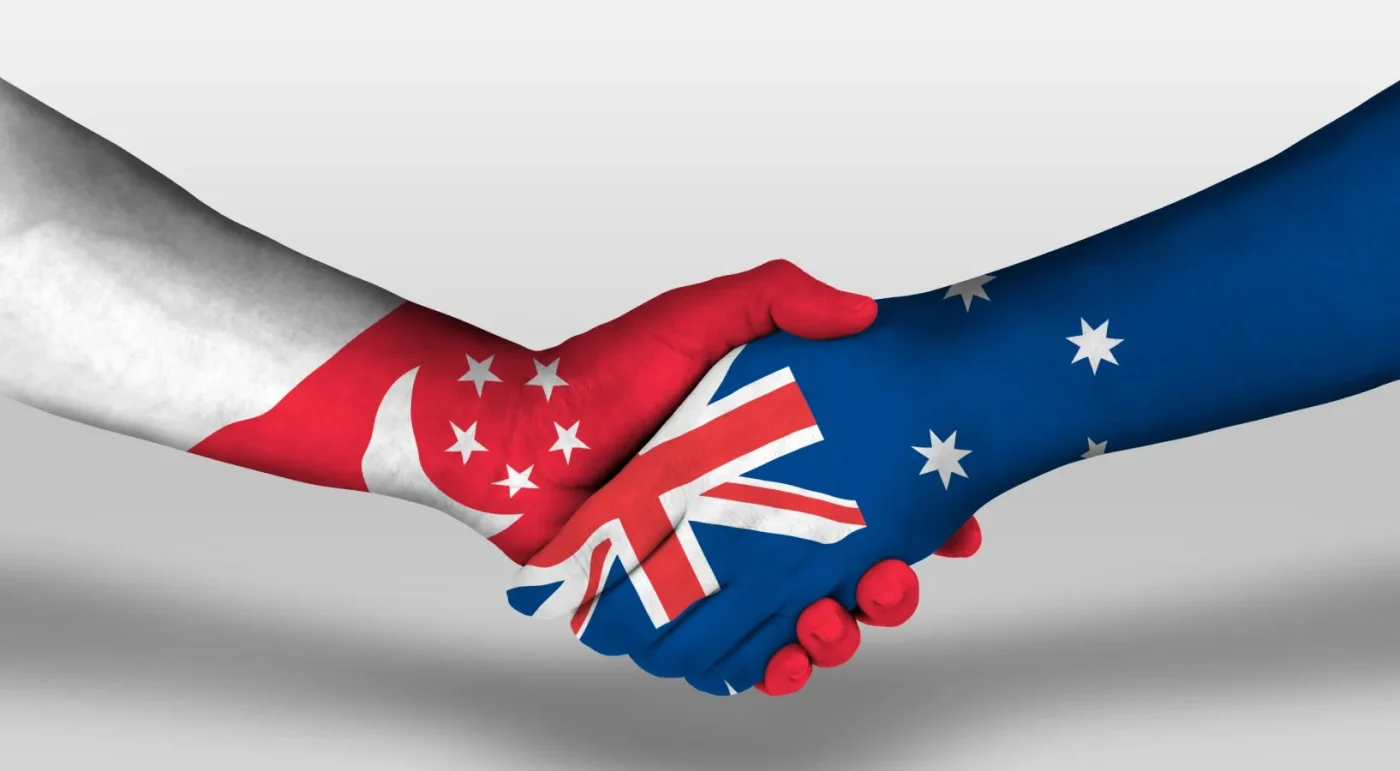Singapore’s Prime Minister Lawrence Wong and Australian Prime Minister Anthony Albanese met on May 20 at Changi Airport, reaffirming their shared commitment to a rules-based international order and deepening bilateral cooperation. The meeting, marking their first encounter since both leaders secured victories in national elections on May 3, underscored the enduring partnership between the two nations as they navigate complex regional dynamics in South-east Asia and beyond.
Hosted by PM Wong for tea, the discussions highlighted the importance of fostering an open and inclusive multilateral system—a cornerstone of stability in a region often tested by geopolitical tensions. With both leaders expressing optimism about future collaboration, their talks signal a renewed push to strengthen ties under the Singapore-Australia Comprehensive Strategic Partnership (CSP), set for an upgrade later in 2025.
A Shared Vision for Regional Stability
The meeting comes at a pivotal time for South-east Asia, where economic competition, maritime disputes, and great power rivalries continue to shape the geopolitical landscape. Singapore, a key player in ASEAN (Association of Southeast Asian Nations), and Australia, with its growing focus on the region through initiatives like the South-east Asia Economic Strategy to 2040, share overlapping interests in promoting stability and prosperity. PM Wong welcomed Australia’s renewed commitment to engaging with ASEAN, a bloc central to Singapore’s foreign policy, while Mr Albanese emphasized the mutual benefits of collaboration.
In a statement, Singapore’s Ministry of Foreign Affairs noted that the leaders reaffirmed the “excellent state of bilateral ties” underpinned by the multifaceted CSP. Established as a framework for cooperation across trade, defense, and cultural exchange, the partnership has been a model for bilateral relations since its inception. The upcoming upgrade, to be formalized at the 10th Singapore-Australia Leaders’ Meeting later this year, is expected to expand cooperation in emerging areas such as digital economy and green technology—sectors critical to both nations’ future growth.
Both leaders also exchanged views on pressing regional and global developments, though specifics of these discussions remain undisclosed. Given the timing of the meeting, topics likely included the ongoing tensions in the South China Sea, where overlapping territorial claims have heightened regional instability, and the broader implications of US-China rivalry. Singapore and Australia have historically advocated for freedom of navigation and adherence to international law in such disputes, positioning them as key voices in maintaining a rules-based order.
Celebrating Six Decades of Friendship
The timing of the meeting carries symbolic weight, as 2025 marks the 60th anniversary of diplomatic relations between Singapore and Australia. PM Wong, in a Facebook post on May 20, described the two nations as “close friends” with shared strategic perspectives. He expressed enthusiasm for visiting Australia later this year to commemorate the milestone, signaling a personal commitment to nurturing the relationship.
Mr Albanese echoed this sentiment on the social media platform X, stating, “Australia and Singapore believe in free trade and global rules that keep the region stable.” He added, “We have so much in common. And by working together, we can deliver for our economies and for our security. Prime Minister Lawrence Wong, thank you for meeting with me today to further this vital partnership.” The emphasis on free trade aligns with both nations’ economic priorities, as Singapore serves as a global financial hub and Australia seeks to expand its trade footprint in Asia.
The personal rapport between the leaders, evident in their public statements, bodes well for future collaboration. Their shared experience of recent electoral victories—PM Wong leading Singapore’s ruling party to another term and Mr Albanese securing a second mandate in Australia—adds a layer of mutual understanding to their dialogue. This personal connection could prove instrumental in navigating challenges that require swift, coordinated responses.
Broader Implications of Australia’s Regional Engagement
Mr Albanese’s visit to Singapore is the final leg of a week-long international trip that included stops in Indonesia and the Vatican, where he attended the inauguration of Pope Leo XIV. The itinerary reflects Australia’s strategic intent to deepen ties with South-east Asian nations while maintaining a global presence. Indonesia, as ASEAN’s largest economy and a key player in regional politics, complements Singapore in Australia’s outreach efforts. The focus on South-east Asia aligns with Canberra’s South-east Asia Economic Strategy to 2040, a long-term plan to boost trade and investment in the region.
For Singapore, the partnership with Australia extends beyond economics to include security and defense collaboration. Joint military exercises, intelligence sharing, and cooperation on counter-terrorism have long been pillars of the relationship. The CSP upgrade is likely to formalize new areas of focus, such as cybersecurity—a growing concern amid rising digital threats in the region. Both nations also share an interest in climate resilience, with Australia’s expertise in renewable energy potentially complementing Singapore’s ambitions to become a green economy hub.
Analysts view the meeting as a signal of continuity in Singapore-Australia relations, even as both nations face domestic and international pressures. For Singapore, maintaining strong ties with like-minded partners like Australia is crucial amid uncertainties in global trade and security. For Australia, deepening engagement with ASEAN through Singapore offers a gateway to influence in a region increasingly central to global geopolitics.
Navigating Regional Challenges Together
The South-east Asian region faces a confluence of challenges, from economic recovery post-pandemic to the impacts of climate change and political instability in neighboring countries. Myanmar’s ongoing civil conflict, for instance, remains a concern for ASEAN, with Singapore playing a leading role in advocating for dialogue and humanitarian aid. Australia, while not a member of ASEAN, has supported these efforts through diplomatic channels and aid programs, aligning with Singapore’s broader objectives.
Another area of mutual concern is the economic ripple effects of global inflation and supply chain disruptions. Singapore, with its export-driven economy, and Australia, a major exporter of commodities like iron ore and natural gas, are both vulnerable to fluctuations in global markets. Collaborative efforts under the CSP could include joint initiatives to stabilize supply chains or promote regional trade agreements, building on existing frameworks like the Regional Comprehensive Economic Partnership (RCEP), which both nations are part of.
Moreover, the leaders’ commitment to a “stable, peaceful, and prosperous region” suggests a shared recognition of the need to counterbalance larger powers’ influence in South-east Asia. While neither leader explicitly mentioned China or the United States during their public remarks, the emphasis on a rules-based order implicitly addresses concerns about unilateral actions that could destabilize the region. Singapore’s strategic position as a neutral mediator and Australia’s role as a middle power provide a complementary dynamic to advocate for multilateral solutions.
Looking Ahead to a Milestone Year
As the 60th anniversary of diplomatic ties approaches, the trajectory of Singapore-Australia relations appears firmly on course for further growth. The planned upgrade of the CSP and PM Wong’s upcoming visit to Australia later in 2025 offer opportunities to showcase tangible outcomes of their partnership. Whether through new trade agreements, joint environmental initiatives, or enhanced security cooperation, the next steps will likely reflect the evolving priorities of both nations.
Public sentiment in Singapore and Australia also appears supportive of closer ties. Social media reactions to the leaders’ posts on May 20 highlighted appreciation for the longstanding friendship, with many users noting the cultural exchanges and economic benefits that have flowed from the relationship. This goodwill provides a strong foundation for addressing any future challenges that may arise.
As the two nations prepare to celebrate six decades of partnership, the question remains how they will adapt their collaboration to a rapidly changing world. With geopolitical tensions simmering and economic uncertainties looming, the resolve shown by PM Wong and Mr Albanese to work together offers a glimmer of hope for sustained regional stability.
















